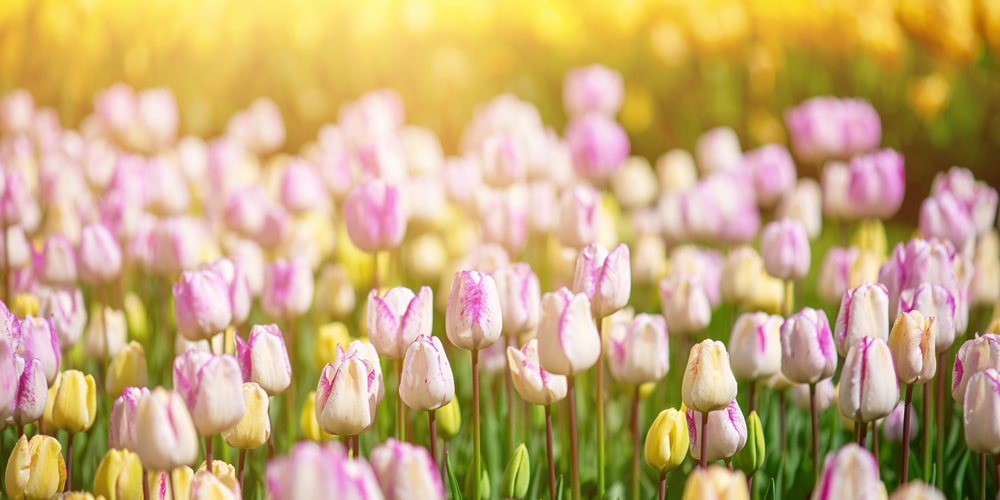Delightfully vibrant tulips are one of the first signs of spring. They seem to glow in the morning sunlight, ranging from the softest pink to the richest purple. A gentle breeze sets the petal dancing, and nobody could ever resist its natural charm and beauty! Aside from its gorgeous and cheerful appearance, one of the best features of a vibrantly colored flower is its ability to attract pollinators like bees. This brings us to the question, “Do bees like tulips?”
Do Bees Like Tulips?
It’s no wonder that tulips are often associated with happiness and joy. Bringing a touch of springtime cheer to any day, it’s no wonder that these are one of the most popular flowers worldwide.
As anyone who has ever seen a field of tulips can attest, these flowers are a sight to behold. But did you know that tulips are also good for bees? The nectar-rich flowers provide a much-needed source of food for bees, and the brightly colored petals help bees to navigate their way back to the hive.
Tulips are also a valuable source of pollen, which is essential for the development of bee larvae. The pollination services that bees provide help ensure a good crop of tulips each year.
Unfortunately, tulips may not provide as much nectar as other spring flowers, such as dandelions. This means that bees may only visit tulips for a short time before moving on to other flowers.
However, tulip varieties that bloom early on during the season can provide an important source of food for bees right after they come out of hibernation.
Do All Tulip Varieties Attract Bees?
In general, tulips attract pollinators like bees and butterflies. As soon as these flowers bloom, bees will be drawn to their vibrant colors and sweet nectar.
Growers have various opinions about which tulip varieties are the best for attracting bees. Some say that single blooms are more attractive to bees than double blooms, while others claim that it doesn’t make a difference.
The truth is, any tulip can attract pollinators like bees. However, some varieties may be more appealing to bees than others, such as:
Queen of the Night Tulip
The Queen of the Night Tulip is a deep purple hue, almost black in color. Its petals are velvety and each bloom seems to absorb the light around it. When in full bloom, a field of Queen of the Night Tulips is a sight to behold.
However, these stunning flowers are not just known for their beauty. They are also known for being a bee magnet. Queen of the Night Tulips are very popular with bees, and it is not uncommon to see hundreds of bees buzzing around a single plant. While other tulip varieties may also attract bees, the Queen of the Night is by far the most popular choice among these pollinators.
Red Emperor Tulip
The Red Emperor Tulip is another variety that is very popular with bees. These tulips are a deep red color, and their petals are slightly ruffled. The Red Emperor is one of the earliest blooming tulips, which makes it an excellent choice for beekeepers.
Not only do bees love the Red Emperor Tulip, but this variety is also known for being very resistant to diseases. This makes it a great choice for gardeners who want to attract bees without worrying about pests and diseases.
Yellow Princess Tulip
The Yellow Princess Tulip is a beautiful yellow color, and its petals are ruffled and slightly fringed. This variety blooms later in the season than other tulips, making it a great choice for gardeners who want to extend the blooming season of their flowers.
While the Yellow Princess Tulip is not as popular with bees as other tulip varieties, it is still a good choice for those who want to attract these pollinators.
Do bees like tulips?: Final Thoughts
Tulips are special for attracting bees because of their ability to provide nectar-rich flowers, brightly colored petals, and pollen.
Despite the limited amount of nectar, tulips still provide an important food source for bees, right after they come out of hibernation.
Any type of tulip can attract pollinators like bees; however, some varieties may be more appealing to bees than others. The most popular choices among beekeepers are the Queen of the Night Tulip and the Red Emperor Tulip.
It doesn’t hurt to add a few tulips, regardless of the variety, if you’re attracting pollinators to your garden. After all, bees aren’t just good for flowers – flowers are also good for bees too!
Related Article: Will Frost Kill Tulips?

